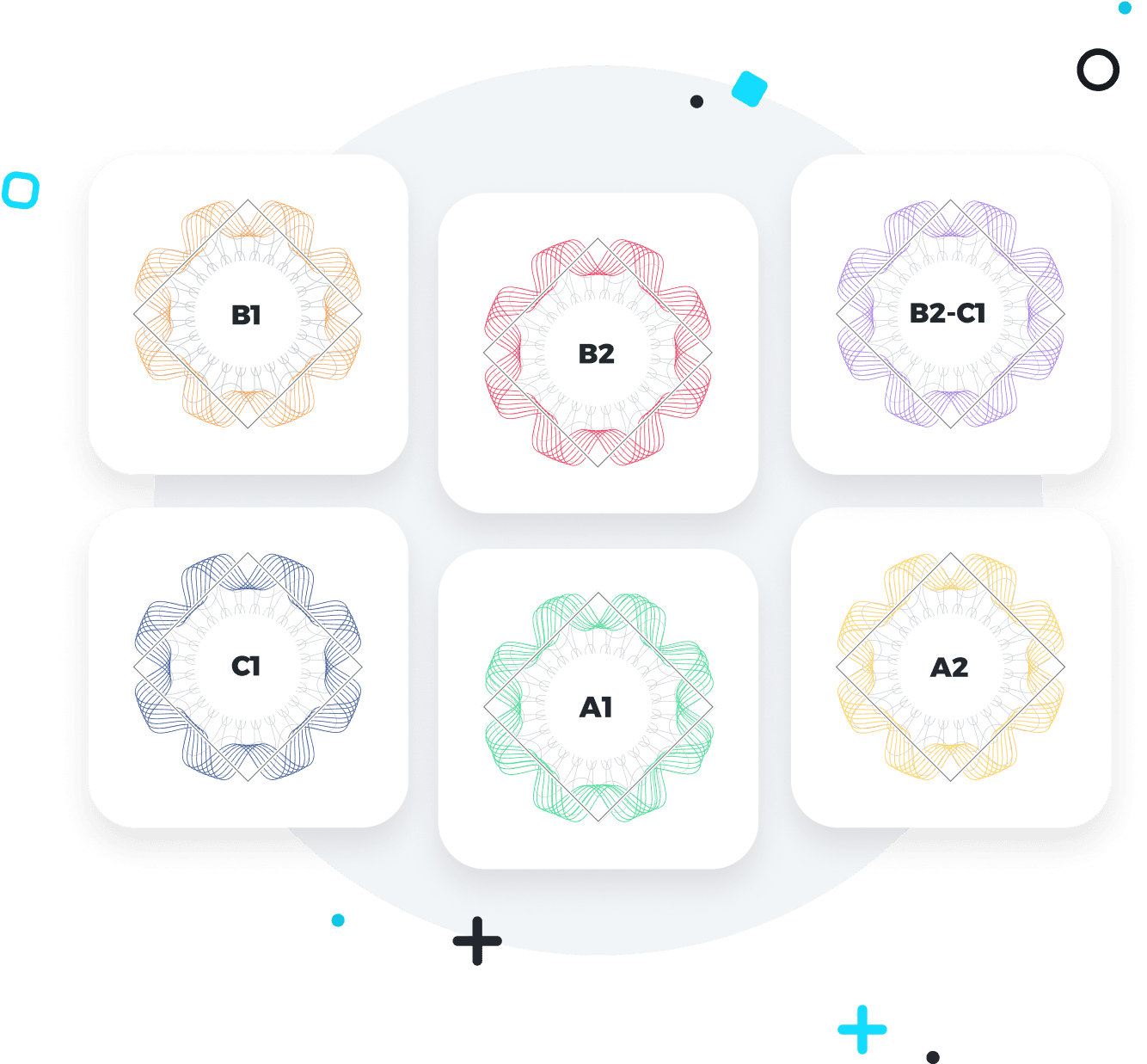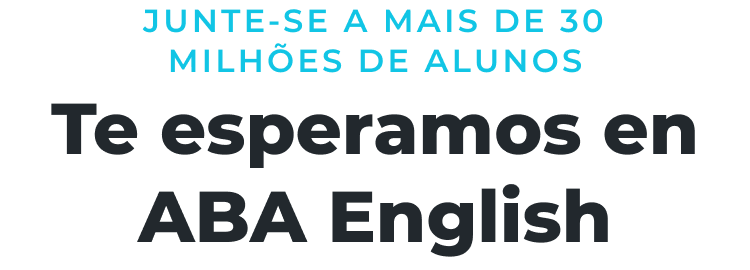Futuro perfeito simples em inglês
Aprenda a formar o future perfect em inglês, quando usá-lo e pratique-o com exercícios. Inscreva-se de graça na ABA English e desfrute todos os dias de uma nova videoaula de gramática gratuita.
O que é o future perfect e quais são seus usos?
O future perfect é um tempo verbal usado para falar de algo que acontecerá antes de um momento específico no futuro, ou seja, antes que outra ação aconteça.
Exemplos:
- 6:00 PM doesn’t work, I will have delivered the homework by then. (6 da tarde não funciona, eu terei entregue minha tarefa até lá.)
- When you get home tomorrow evening, I’ll have finished preparing dinner. (Quando você chegar em casa amanhã à noite, eu terei terminado de preparar o jantar.)
+30 MILHÕES DE ALUNOS
Junte-se à escola digital de inglês
mais grande do mundo e aprenda inglês
Como formar o futuro perfeito em inglês?
A estrutura do future perfect é composta por dois elementos. Por um lado, o verbo to have no futuro simples e, por outro, o passado particípio do verbo principal.
Future perfect na forma afirmativa
Para as orações afirmativas no futuro perfeito simples, a estrutura gramatical é bastante simples. É importante se lembrar de dois elementos que definem este tempo verbal: will have e o passado particípio. Preste atenção à estrutura:
Sujeito + will have + verbo no passado particípio + complemento.
Exemplos:
- I’ll have finished cleaning the house by the time they arrive. (Eu terei terminado de limpar a casa quando eles chegarem.)
- They will have completed the research by 9 p.m. (Eles terão completado a pesquisa até as 9 da noite.)
Futuro perfeito em inglês na forma negativa
Para as orações negativas no future perfect, basta adicionar a partícula “not” depois do verbo auxiliar will. Além disso, lembre-se de que também é possível usar a contração “won’t”.
Sujeito + will + not + have + verbo no passado particípio + complemento.
Exemplos:
- Greg will not have eaten lunch before the English lesson starts this evening. (Greg não terá almoçado antes do começo da aula de inglês esta tarde.)
- She’ll not have finished painting the room before the baby arrives. (Ela não terá terminado de pintar o quarto antes do bebê chegar.)
Orações interrogativas no future perfect
Agora, vamos ver como formar uma pergunta usando o futuro perfeito em inglês. Basta reposicionar os elementos gramaticais da estrutura. Preste atenção na ordem de cada um dos elementos.
Will + sujeito + have + verbo no passado particípio + complemento.
Exemplos:
- Will you have finished cleaning the office when she arrives? (Você terá terminado de limpar o escritório quando ela chegar?
- Will they have brushed the dogs before the show opening? (Eles terão penteado os cachorros antes da abertura da exposição?)
Já conhece seu
nível de inglês?
Comece o teste
Cadastre-se em nossa página e acesse o teste de nível gratuito. Em poucos minutos você conhecerá seu nível e poderá continuar progredindo no curso.

Diferença entre o future perfect simple e o future continuous
Como já vimos, o future perfect simple em inglês é usado para se referir a uma ação completada no futuro. Por sua parte, o future continuous em inglês é usado para falar de ações que acontecerão no futuro e terão um certo tempo de duração.
A seguir, apresentamos as duas estruturas afirmativas para que você possa verificar quais são as diferenças:
| Future perfect | Future continuous |
| Sujeito + will have + verbo no passado particípio + complemento | Sujeito + will/shall + be + verbo principal –ing + complemento |
Exemplos no future perfect
- I will have started this book by next week. (Eu terei começado este livro até a semana que vem.)
- We will not have done our job. (Nós não teremos terminado nosso trabalho.)
- What will you have done? (O que você terá feito?)
- She will have learned English by the end of the year. (Ela não terá aprendido inglês até o final do ano.)
- They will not have served the dinner before their guests arrive. (Eles não terão servido o jantar antes dos convidados chegarem.)
- Will you have booked the flight before the promotion is over? (Você terá reservado o voo antes da promoção acabar?)
Exercícios do futuro perfecto
Exercícios do future perfect simples afirmativo
Traduza as seguintes orações afirmativas no futuro perfeito.
- Ele terá terminado seus estudos até lá.
- Ela terá chegado lá até as 3 da tarde.
- No dia 1º de maio, eu terei estado em Paris por 3 meses.
- Quando você ler isso, eu terei partido.
- Esta hora, na semana que vem, eles terão terminado seu exame.
Respostas:
- He will have finished his studies by then.
- She will have gotten there at 3:00 PM.
- On the 1st of May, I will have been in Paris for 3 months.
- When you read this, I will have been gone.
- At this hour next week, they will have finished their exam.
Exercícios do future perfect negativo
Conjugue os verbos entre parênteses para formar orações negativas no future perfect.
1. The baby ______________ (not play) with the toys.
2. You ______________ (not talk) talked to her.
3. She ______________ (not cut) his hair.
4. You ______________ (not arrive) home by then.
5. They ______________ (not eat) the food.
Respostas:
- will not have played
- will not have talked
- will not have cut
- will not have arrived
- will not have eaten
Exercícios interrogativos do futuro perfecto
Escolha a opção correta para formar perguntas no future perfect.
1. What __________in that case?
a. would I done
b. shall I have do
c. will I have done
2. Will he __________the cell phone?
a. had bought
b. have bought
c. have buyed
3. Will we __________ the new season by June?
a. have seen
b. had seen
c. would see
4. Will you____________ the job by next week?
a. would have finish
b. have finished
c. had finish
5. How will they ___________ the store?
a. had find
b. have find
c. have found
Respostas:
1.C, 2.B, 3.A, 4.B, 5.C
Links úteis


























